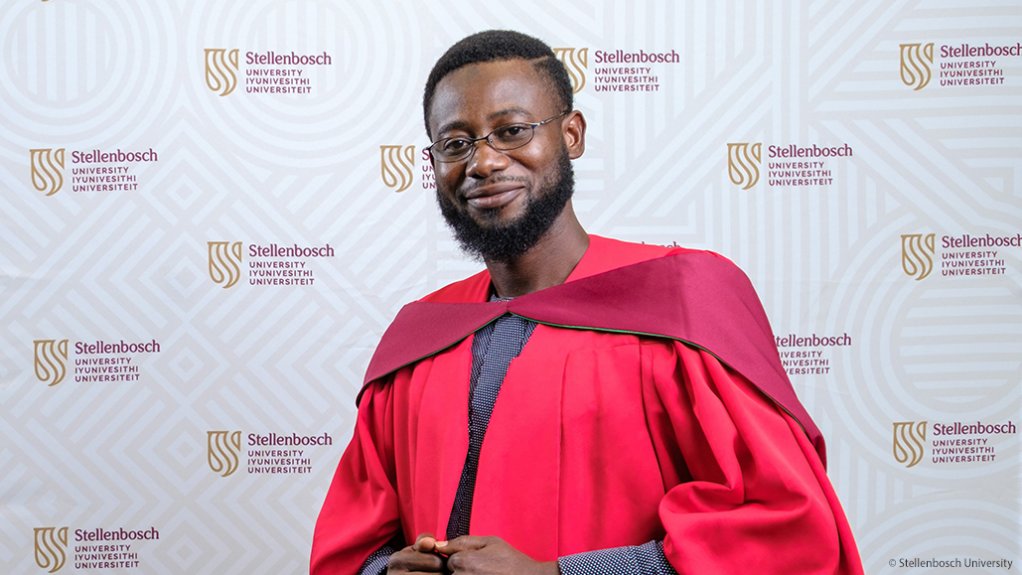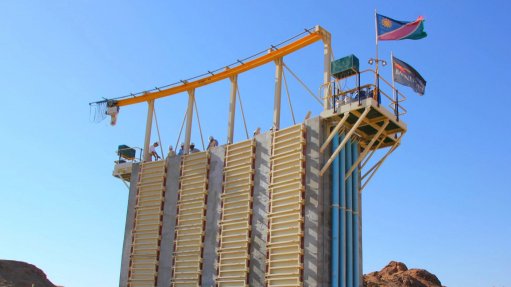Stellenbosch researcher creates new composite material
A researcher at Stellenbosch University (SU), near Cape Town, in the Western Cape, has developed a new composite material, made from Port Jackson trees (Acacia saligna) and recycled low-density polyethylene plastics, and demonstrated that it can be used to make thermal and insulation boards for low-cost housing.
Port Jackson trees are a highly invasive and environmentally damaging species in South Africa, and among the ten worst invasive alien plant species in the country. Polyethylene is primarily used to make packaging, including plastic bags.
The researcher is Ghana-born Dr Abubakar Sadiq Mohammed. Qualified as a specialist in industrial art and wood science in Ghana, he enrolled in the Faculty of AgriSciences at SU, to pursue a PhD in wood product science (which he was awarded in December). The development of the new material was the result of his PhD studies, which were supported by Germany’s Federal Ministry of Education and Research.
South African government-funded campaigns to clear invasive species, including Port Jackson trees, are creating a plentiful supply of natural materials, for which no significant use currently exists, except as, to a limited degree, firewood. Just leaving the cleared trees where, or near where, they were uprooted only creates a fire hazard, when they dry out. And there are innumerable plastic bags polluting the environment.
“Plastic waste is a known global menace, so the idea was to transform this waste material into something useful,” he explained. “I was also interested in developing affordable, eco-friendly alternatives to existing low-cost building materials.”
His research embraced three species of invasive tree, the other two being the black wattle (Acasia mearnsii) and the red river gum (Eucalyptus camaldulensis). Composite boards made with wood from these two tree species met the minimum requirements for interior thermal and insulation boards.
“A surprising finding, however, was that regardless of biomass type, boards made with Port Jacksons showed significantly better mechanical properties than those made with the other two wood species,” reported SU. “This was an unexpected result, especially the large difference between the two – otherwise very similar – Acacia species.”
In making the composites, Mohammed made use of every element of the trees, including the bark and leaves. (Normally, in the production of wood-plastic composites, the bark, leaves and any other non-woody parts of the tree are regarded as contaminants and separated out before the wood is turned into chips or fibres.) He used the trees as they were received, without subjecting them to any preprocessing.
The recycled plastic used in the project was the cheapest and lowest grade available. It was subject to the minimum level of processing, being merely shredded and conglomerated, and not turned into plastic pellets.
Comments
Press Office
Announcements
What's On
Subscribe to improve your user experience...
Option 1 (equivalent of R125 a month):
Receive a weekly copy of Creamer Media's Engineering News & Mining Weekly magazine
(print copy for those in South Africa and e-magazine for those outside of South Africa)
Receive daily email newsletters
Access to full search results
Access archive of magazine back copies
Access to Projects in Progress
Access to ONE Research Report of your choice in PDF format
Option 2 (equivalent of R375 a month):
All benefits from Option 1
PLUS
Access to Creamer Media's Research Channel Africa for ALL Research Reports, in PDF format, on various industrial and mining sectors
including Electricity; Water; Energy Transition; Hydrogen; Roads, Rail and Ports; Coal; Gold; Platinum; Battery Metals; etc.
Already a subscriber?
Forgotten your password?
Receive weekly copy of Creamer Media's Engineering News & Mining Weekly magazine (print copy for those in South Africa and e-magazine for those outside of South Africa)
➕
Recieve daily email newsletters
➕
Access to full search results
➕
Access archive of magazine back copies
➕
Access to Projects in Progress
➕
Access to ONE Research Report of your choice in PDF format
RESEARCH CHANNEL AFRICA
R4500 (equivalent of R375 a month)
SUBSCRIBEAll benefits from Option 1
➕
Access to Creamer Media's Research Channel Africa for ALL Research Reports on various industrial and mining sectors, in PDF format, including on:
Electricity
➕
Water
➕
Energy Transition
➕
Hydrogen
➕
Roads, Rail and Ports
➕
Coal
➕
Gold
➕
Platinum
➕
Battery Metals
➕
etc.
Receive all benefits from Option 1 or Option 2 delivered to numerous people at your company
➕
Multiple User names and Passwords for simultaneous log-ins
➕
Intranet integration access to all in your organisation





















